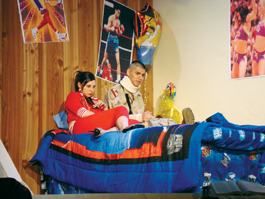home | metro silicon valley index | the arts | stage | review

Photograph by Carlos Velasquez
DESTINY CALLS: A housebound Iraq vet (Freddy Izaguirre) entertains his girlfriend Destiny (Denise Angélica Berumen) in Teatro Visión's 'Hero.'
Coming Home
Teatro Visión's 'Hero' finds serious humor in tale of confused Iraq vet's return to home life
By Marianne Messina
LUIS ALFARO'S soft-edged comedy, Hero, takes place within the home and family of a young returning Iraq war veteran, thus setting war up as a satellite event seen only by its gravitational effects. Teatro Visión has ensured the homey intimacy by staging Hero at downtown San Jose's MACLA, a venue much smaller than its usual Heritage Plaza Theater, and director Elisa Marina Alvarado capitalizes on the ambience with comfortable, unrushed pauses and contemplative moods.
Soon to receive a medal, the returning Hero holes up in his bedroom, stealing out late at night to stock up on snack food as if his room were a bomb shelter. Occasionally, he admits visitors—his Vietnam vet Uncle (César E. Flores), his former girlfriend Destiny (Denise Angélica Berumen) and his younger brother, Junior (Jery Rosas).
In neck brace and arm sling, Freddy Izaguirre plays Hero as an easygoing surfer dude, showering his antiwar brother with epithets like "enemy," "lady" and "Dixie chick." In return, Junior taunts Hero about the war: "It was a commercial." Prepared for some veteran-to-veteran commiseration, Uncle is surprised to hear that Hero saw very little action and got his war wounds falling off the back of a truck. "I saw people on fire burned alive," Uncle reveals, in one of the play's rare serious moments, concluding, "You are not the hero; I am!"
In creating Hero's room, set designer Paul Skelton not only supports the text in meticulous detail—the Homer Simpson welcome-home balloon, a Kobe Bryant poster—but isolates the room on a riser, like a lonely, heroic pedestal. Hero spends whole scenes under the blankets, visibly distanced from everything in his room.
Conversations around the house are quirky, especially when the valley-ized Destiny arrives (her theme song is "Bossy"), dressed in spectacular, revealing red and glittering gold (the costumes are by Deborah Rosas). In no time, Destiny is telling Mom (Melinda Moreno-Miller) that she is "boning" her son: "I know you're the mom, so you have, like, your blinders on ..." Destiny's lack of conventional intelligence is nevertheless gifted with its own kind of logic. Recalling some obnoxious chick who called her out in high school, Destiny concludes that "sometimes war is unavoidable." Attractive, fresh, pose-conscious one minute and completely unself-conscious the next, Berumen is a scene-stealer.
There are no weak links in this delightful cast. As Mom, Moreno-Miller speaks office chatter in a bureaucratic drone. But Mom, too, says unique and marvelous things as she questions a life spent working for the Water and Power Company. When companies minimized maternity leave, she recounts, "I broke my water at the Water and Power," and was forced to have babies "like Angelina Jolie—fit them in between movies." Alfaro gently weaves social observation and commentary into the cultural references natural for each personality. Poet and peace activist Junior references Paul Bowles' The Sheltering Sky, inspired by its existentialism, a central theme; each character is wrestling with a faint undercurrent of emptiness.
Meanwhile, Uncle—who claims to have "died" in Vietnam—just is. With his earring and beret, Flores looks like a natural, rolling a joint or characterizing Junior: "He's cultured, in a faggoty way." One scene opens with Uncle sitting in semidarkness staring at a lava lamp (almost a character in its own right). Under hazy blue lighting, red globules burble as trippy Santana guitar strains sustain the contemplative mood (sound designer Tommy Aguilar).
Hero's war job was to guard a water truck. "Water's like oil—important," he tells Junior. The back of Junior's notebook reads, "No Blood for Oil." The lava lamp, called for in Alfaro's script, alludes to these imbalanced liquid exchanges. As the goo balls flow and mutate, it seems that Uncle unconsciously recognizes the central mystery. The effect is a light-handed, sometimes suggestive touch, drawing no further conclusions than Uncle's offhand remark that war "is like a release."
HERO, a Teatro Visión production, plays Thursday–Saturday at 8pm and Sunday at 2pm through April 27 at MACLA, 510 S. First St., San Jose. Tickets are $10–$24. (408.272.9926)
Send a letter to the editor about this story.
|
|
|
|
|
|